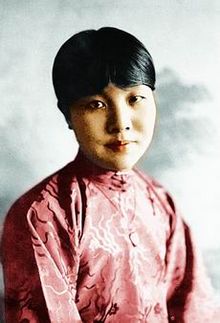He talked about knowing that Mao Tze Tung was a librarian there.
He mentioned that he saw Han Suyin in the distance. She was a remarkable young lady and the men liked to look at her. Rosalie Chou was her original name. She was at the university from 1933 to 1935. Father said he bought and read almost all her books in later years. His first book was Destination Chong Ching, which he read from time to time.
I inherited that book from him and the other books of Han Suyin I read as part of my Sixth Form Chinese history reference books, borrowed from the school library.
He often said how beautiful the gardens were and he hoped that one day we would be able to see it. But he was depressed by the Commnist rule, fearing that he would never see Beijing again. In fact what he feared came true because he passed away in 1965.
He remained good friends with Wong Cheng Ang and upon their return to Sibu, they maintained their good relationship until 1962 when he left the town to join the guerrillas in the jungle. My father had tried to discouraged his political move. At that time my father was a founder member of SUPP. Father passed away in 1965. Wong was shot to death in 1972 in Engkilo.
Yenching University (simplified Chinese: 燕京大学; traditional Chinese: 燕京大學; pinyin: Yānjīng Dàxué) was a university in Beijing, China. It integrated three Christian colleges in the city in 1919. Yenching is an alternative name of old Beijing derived from its status as capital of Yan state, one of the seven Warring States that existed until the 3rd century BC.
The university was originally founded under the name Huiwen University. In its early years, it was in a chaotic situation, due to its financing by several churches:
- Huiwen University (滙文大學) was founded by the Methodist Episcopal Church (美以美會) in 1889. Its precursor was (崇內懷理書院) founded in 1870. Hiram Harrison Lowry was its principal.
- North China Harmony Women's University (華北協和女子大學). Its precursor (貝滿女塾) was founded in 1864.
- Tongzhou Harmony University (通州協和大學). Its precursor (公理會潞河書院) was founded by the Congregational Church. Devello Z. Sheffield was the school's principal.
Stuart attracted major Chinese and Western scholars to teach. Religion was not a qualification, although Stuart gave major support to the School of Theology. In 1928 the Harvard-Yenching Institute, was jointly founded by Yenching University and Harvard University for the teaching of the humanities and social sciences in East Asia and Southeast Asia. This independent institute continues to exist on the Harvard campus in Cambridge, Massachusetts. Also in 1928, American journalist and educator Walter Williams established a department of journalism.
By 1930, the school was among the top universities in China, its teaching distinguished itself by a considerable academic freedom.
During the Second Sino-Japanese War, Peiping was occupied by Japan and the university was moved to Chengdu in Sichuan. After the People's Republic of China was established in 1949, Yenching University with its Christian background was closed. Its arts and science faculties were merged into Peking University, its engineering section was merged with Tsinghua University, and Peking University obtained the Yenching campus. In 1952 Peking University moved from central downtown Beijing to the previous Yenching campus in the city's Haidian District.
Among the scholars who taught at Yenching were Bing Xin (Xie Wanying), writer;

Bing Xin was a lecturer in Yenching from 1933 to 1936, when my father was an undergraduate. Later on my father was to tell us that she was really a good writer and a Foochow. He was happy to know that many secondary school Chinese teachers teach their students using her texts.
John Stuart Burgess (sociologist); Kenneth K.S. Chen (historian of Buddhism); Zhang Dongsun (Philosopher); K. C. Hsiao (political scientist); Hu Shih (scholar); Lu Zhiwei (theologian); Qian Mu (historian); Wu wenzao(sociologist); Edgar Snow (journalism); Wu Leichuan (theology); Zhao Zichen (theology); Louis Rhys Oxley Bevan (Law).
Prominent alumni include: Fei Xiaotong (anthropologist); Han Suyin (author);

Huang Hua (diplomat); Teng Ssu-yu (historian).



1 comment:
golden goose
palm angels outlet
off white clothing
fear of god clothing
kyrie 8
jordan outlet
fear of god clothing
kevin durant shoes
palm angels
fear of god t shirt
Post a Comment